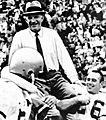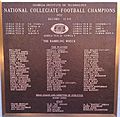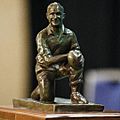Bobby Dodd facts for kids
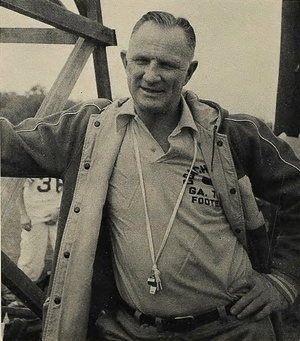
Dodd from the 1963 Blueprint
|
|
| Biographical details | |
|---|---|
| Born | November 11, 1908 Galax, Virginia |
| Died | June 21, 1988 (aged 79) Atlanta, Georgia |
| Playing career | |
| 1928–1930 | Tennessee |
| Position(s) | Quarterback, tailback, punter |
| Coaching career (HC unless noted) | |
| 1931–1944 | Georgia Tech (assistant) |
| 1945–1966 | Georgia Tech |
| Administrative career (AD unless noted) | |
| 1950–1976 | Georgia Tech |
| Head coaching record | |
| Overall | 165–64–8 |
| Bowls | 9–4 |
| Accomplishments and honors | |
| Championships | |
|
|
| Awards | |
|
|
| College Football Hall of Fame Inducted in 1993 (profile) |
|
Robert "Bobby" Lee Dodd (November 11, 1908 – June 21, 1988) was a very famous American college football coach. He coached at the Georgia Institute of Technology (Georgia Tech). He was so good that he was chosen for the College Football Hall of Fame as both a player and a coach. Only two other people have ever done this!
Bobby Dodd was born in Galax, Virginia. He grew up in Kingsport, Tennessee. There, he played many different sports in high school. After high school, he became a quarterback for the University of Tennessee football team.
In 1931, Bobby Dodd became an assistant coach at Georgia Tech. He worked for Coach William Alexander. In 1945, Dodd took over as the head coach. He coached until the 1966–67 season. During his career, his teams won 165 games, lost 64, and tied 8. He also worked as the athletic director for Georgia Tech from 1950 to 1976. Bobby Dodd passed away in June 1988 when he was 79 years old.
Bobby Dodd as a Player
Bobby Dodd was the quarterback for the University of Tennessee football team from 1928 to 1930. He played for a famous coach named Robert Neyland. Dodd actually wanted to play for Georgia Tech, but they didn't offer him a scholarship. With Dodd as their starting quarterback, Tennessee won 27 games, lost only 1, and tied 2.
Dodd played a big part in a very famous game. In his second year, Tennessee played against Alabama. Dodd threw a touchdown pass to tie the game 13–13. Then, he punted the ball out of bounds very close to Alabama's goal line. On the next play, Tennessee got a "safety" and won the game 15–13. This was a super important game because these two teams were big rivals.
Another time, Dodd showed his clever thinking. In a 1930 game against Florida, he told his teammates about a play he used in high school. When the ball was snapped, it was just left on the ground. All the players ran in one direction. Then, the center came back, picked up the ball, and easily scored the winning touchdown! Tennessee fans even had a special saying for Dodd: "In Dodd we trust."
In 1930, Bobby Dodd was chosen for the Grantland Rice All-American team. He was only the second player from Tennessee to get this honor. In 1959, Dodd was inducted into the University of Tennessee's Hall of Fame. He was also chosen for the College Football Hall of Fame as a player in the same year.
Bobby Dodd as a Coach
As the head coach at Georgia Tech, Bobby Dodd had an amazing record of 165 wins, 64 losses, and 8 ties. He led Georgia Tech to win two Southeastern Conference (SEC) championships in 1951 and 1952. In 1952, his team also won a national championship!
While he was coach, Tech played in 13 major bowl games. They won 9 of these games, including six in a row from 1951 to 1956. His team also had an incredible 31-game winning streak from 1951 to 1953. The 1952 national title was part of a perfect 12–0 season. They also won the Sugar Bowl against Ole Miss that year.
Dodd's coaching ideas were all about taking good care of his players. He didn't believe in super tough physical practices. Instead, he liked practices that focused on the small, important details of football. His smart ideas led to many wins.
Dodd also understood the big rivalry with the University of Georgia. His teams won 8 games in a row against Georgia from 1946 to 1954. During this winning streak, Tech scored 176 points, while Georgia scored only 39. This 8-game winning streak is still the longest for either team in the series. Dodd finished his career with a 12–9 record against Georgia.
Later in his career, Georgia Tech left the Southeastern Conference. This happened partly because of a disagreement between Dodd and Alabama Crimson Tide Coach Bear Bryant. The problem started during a game in 1961. An Alabama player hit Georgia Tech's Chick Granning in the face after Granning had relaxed because a fair catch signal was given. Granning was badly hurt and couldn't play football again. Dodd believed the hit was on purpose and asked Bryant to suspend the player. Bryant did not suspend him, which made Dodd very upset.
Another issue for Dodd was how some other SEC schools were recruiting players. Some schools would recruit too many players. Then, after signing day, they would remove the extra players. This meant those players couldn't find another team to play for. Dodd asked the SEC leaders to stop these unfair practices, but they didn't. Because of these issues, Dodd decided to take Georgia Tech out of the SEC in 1963. For the last four years of Dodd's coaching career, Tech played without being part of a league, like Notre Dame and Penn State did at the time.
In 1967, Dodd stopped being the head coach. He gave the job to his assistant, Bud Carson. Dodd continued to work as the athletic director until 1976.
Bobby Dodd's Legacy
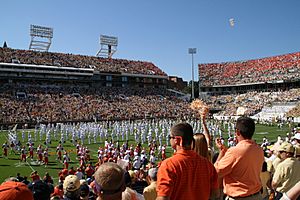
Bobby Dodd always wanted to win every game. But unlike some other coaches, he didn't believe in risking his athletes' health to win. He truly believed that the most important part of college football was the college football player himself.
To honor Bobby Dodd's great character, an award is given out each year. It's called the Bobby Dodd Coach of the Year Award. It goes to a Division I college coach who shows great leadership both on and off the field.
Bobby Dodd was inducted into the College Football Hall of Fame as a player in 1959. He was inducted again as a coach in 1993. In 1988, Georgia Tech named its football stadium Bobby Dodd Stadium to honor him. There's also the Bobby Dodd Institute, which helps people with disabilities. It's named after him because of his support for people with disabilities.
Images for kids
-
Bobby Dodd Stadium at Grant Field
-
Bobby Grier at the controversial 1956 Sugar Bowl
 | Shirley Ann Jackson |
 | Garett Morgan |
 | J. Ernest Wilkins Jr. |
 | Elijah McCoy |





